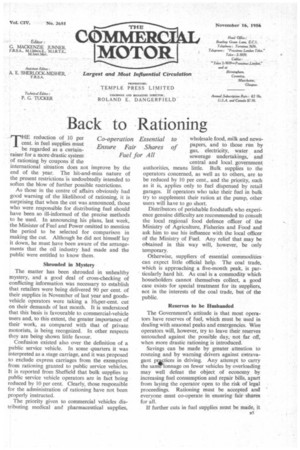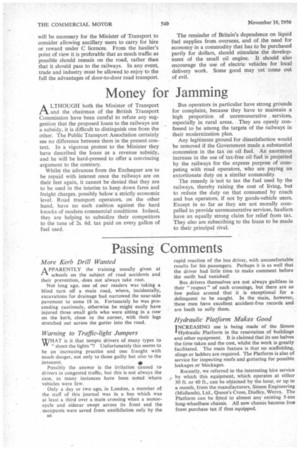Back to Rationing
Page 39

Page 40

If you've noticed an error in this article please click here to report it so we can fix it.
Co-operation Essential to Ensure Fair Shares of Fuel for All
reduction of 10 per cent. in fuel supplies must c be regarded as a curtainraiser for a more drastic system of rationing by coupons if the international situation does not improve by the end of the year. The hit-and-miss nature of the present restrictions is undoubtedly intended to soften the blow of further possible restrictions.
As those in the centre of affairs obviously had good warning of the likelihood of rationing, it is surprising that when the cut was announced, those who were responsible for distributing fuel should have been so ill-informed of the precise methods to be used. In announcing his plans, last week, the Minister of Fuel and Power omitted to mention the period to be selected for comparison in making the cut. Although he did not himself lay it down, he must have been aware of the arrangements that the oil industry had made and the public were entitled to know them.
Shrouded in Mystery The matter has been shrouded in unhealthy mystery, and a good deal of cross-checking of conflicting information was necessary to establish that retailers were being delivered 90 per cent. of their supplies in November of last year and goodsvehicle operators were taking a 10;per-cent. cut on their demands of last month. It is understood that this basis is favourable to commercial-vehicle users and, to this extent, the greater importance of their work, as compared with that of private motorists, is being recognized. In other respects they are being shown little favour.
Confusion existed also over the definition of a public service vehicle. In some quarters it was interpreted as a stage carriage, and it was proposed to exclude express carriages from the exemption from rationing granted to public service vehicles. It is reported from Sheffield that bulk supplies to public service vehicle operators are in fact being reduced by 10 per cent. Clearly, those responsible for the administration of rationing have not been properly instructed.
The priority given to commercial vehicles distributing medical and pharmaceutical supplies, wholesale food, milk and newspapers, and to those run by gas, electricity, water and sewerage undertakings, and central and local, government authorities, means little. Bulk supplies to the operators concerned, as well as to others, are to be reduced by 10 per cent., and the priority, such as it is, applies only to fuel dispensed by retail garages. If operators who take their fuel in bulk try to supplement their ration at the pump, other users will have to go short.
Distributors of perishable foodstuffs who experience genuine difficulty are recommended to consult the local regional food defence officer of the Ministry of Agriculture, Fisheries and Food and ask him to use his influence with the local officer of the Ministry of Fuel. Any relief that may be obtained in this way will, however, be only temporary.
Otherwise, suppliers of essential commodities can expect little official help. The coal trade, which is approaching a five-month peak, is particularly hard hit. As coal is a commodity which householders cannot themselves collect, a good case exists .for special treatment for its suppliers, not in the interests of the coal trade, but of the public.
Reserves to be Husbanded The Government's attitude is that most operators have reserves of fuel, which must be used in dealing with seasonal peaks and emergencies. Wise operators will, however, try to leave their reserves untouched against the possible day, not far off, when more drastic rationing is introduced.
Savings can be made by greater attention to routeing and by warning drivers against extravagant prktices in driving. Any attempt to carry the samrtonnage on fewer vehicles by overloading may well defeat the object of economy by increasing fuel consumption and repair bills, apart from laying the operator open to the risk of legal proceedings. Rationing must be accepted and everyone must co-operate in ensuring fair shares for all.
If further cuts in fuel supplies must be made, it B5 will be necessary for the Minister of Transport to consider allowing ancillary users to carry for hire or reward under C licences. From the haulier's point of view it is preferable that as much traffic as possible should remain on the road, rather than that it should pass to the railways. In any event, trade and industry must be allowed to enjoy to the full the advantages of door-to-door road transport. The reminder of Britain's dependence on liquid fuel supplies from overseas, and of the need for economy in a commodity that has to be purchased partly for dollars, should stimulate the development of the small oil engine. It should also encourage the use of electric vehicles for local delivery work. Some good may yet come out of evil.




















































































































